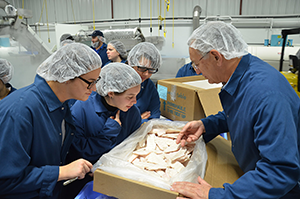Last summer, Yale Hospitality and Yale students participated in a two-day trip to Cape Cod where they met the people who provide seafood to Yale. The trip highlighted Yale’s commitment to source food that is sustainable for communities and for the environment.
Chatham, a fishing village on the bottom arm of Cape Cod, used to be a hotspot for cod until the species was overfished. Now, there are only two boats that go out and catch cod. Economically dependent on the fishing market, the community re-focused its efforts on sustainability, and diversified its catch. Today, they catch species such as dogfish and redfish that are underutilized, abundant, and replenish quickly.

Sea to Table, the aquatic version of Farm to Table, helps communities like Chatham market these fish to groups like Yale. Last summer, they organized the opportunity that brought the Yale group to Cape Cod.
Bob Sullivan, Director of Yale Dining Operations, was one of the participants on the trip. “It’s a rewarding feeling to know that we’re helping to keep these communities up and thriving, sustaining their heritage and livelihoods.”
The group shared a meal with the fishermen, eating the fresh fish they caught. Lauren Sapienza, Pierson ’18, was one of six students on the trip. Her favorite part “was having the opportunity to try all the fresh, local seafood after having met the fishermen who supply Yale with much of the seafood” she sees “in the dining halls.”
The fishing operation is kept local, which helps to keep the fish fresh. After Chatham, the group went just over an hour away to New Bedford where they visited the processing plant and the freezing plant.
At the processing plant, Marder Trawling, the group saw how workers prepare dogfish for freezing. The process aims to reduce waste. According to Sullivan, a lot of the work is done by hand, and everything gets repurposed. For instance, scraps get used for bait.
The group had the opportunity to talk with the workers directly. “We learned that they have good working conditions, make a living wage, and are treated like family,” says Sullivan. “It’s not just about the fish, we are also supporting a cool company that is treating its employees right.”
 At the next plant, the fish were flash frozen. The process consists of a nitrogen freezing tunnel that is minus 177 degrees F. Fish go through the tunnel, and in three minutes they are completely frozen. Then a conveyor goes through distilled water which creates a protective shell around the fish. According to Ron DeSantis, Yale Director of Culinary Excellence, this process keeps the water out and the product fresh.
At the next plant, the fish were flash frozen. The process consists of a nitrogen freezing tunnel that is minus 177 degrees F. Fish go through the tunnel, and in three minutes they are completely frozen. Then a conveyor goes through distilled water which creates a protective shell around the fish. According to Ron DeSantis, Yale Director of Culinary Excellence, this process keeps the water out and the product fresh.
During the last part of the trip, the group met with fishermen, members of Sea to Table, and the Cape Cod Commercial Fishermen’s Alliance where they learned about their shared priority of providing healthy, sustainable, and affordable seafood.
Yale Hospitality’s commitment to quality seafood is reflective of their larger initiatives. All their animal proteins are top of the line. “The beef and lamb is grass-fed and grass-finished. The chicken never has hormones, and the fish are fresh and sustainable,” says DeSantis.
“Understanding the sustainable sourcing of Yale’s seafood has given me new perspective on the challenges that large institutions face in providing high quality, sustainable food,” says Sapienza. “All of the students on the trip and I developed a new-found appreciation for the incredible meals that Yale Dining provides for students daily.”
The Sea to Table trip was one of the many opportunities hosted by Yale Hospitality that exposes students to Yale’s food initiatives. Through the Yale College Council, students can sign up for similar events, such as Farm Tours every autumn.